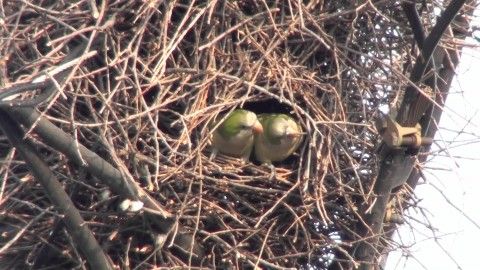The Lessons From A Little Bird and The Need for Family Caregiver Support
Discover valuable lessons on family caregiver support from the gregarious and resilient Monk Parrot. Learn how to support and offer help to the invisible patient, the family caregiver, who selflessly provides long-term care without acknowledgement or support.

Family caregiver support, or the lack thereof, presents a significant challenge for countless caregivers. I regularly hear their silent pleas for help on my website and in various forums. One morning, as I ventured out for a walk, I had an unexpected encounter with some bright green birds that made me reflect on the resilience of caregivers and the urgent need for support.
As I strolled along on that chilly morning, I was startled by screeching sounds emanating from a group of vibrant green birds. At first, I questioned if my imagination had run wild. Bundled up to face the cold, my mind often wandered to dreams of walking on a warm, tropical beach. Thoughts of South Florida and the distinctive screeches of tiny parrots I used to see while visiting my youngest son filled my head. Surely, these couldn't be the same kind of birds, I thought.

To my surprise, I was wrong. There's a colony of Monk Parrots thriving in Edgewater, New Jersey, for over 35 years, despite typically inhabiting tropical climates. I marveled at their tenacity and survival skills.
During my walk, I couldn't help but draw parallels between these resilient Monk Parrots and the family caregivers I've supported over the years. It struck me that family caregivers, like these parrots, are survivors. Once I returned home and delved into research about these remarkable birds, I realized the invaluable lessons they could teach us about the necessity of family caregiver support.
Monk Parrots construct communal nests that can grow to the size of a small car. Each family inhabits a separate "apartment" within the nest, accessed through distinct circular entrances. These social birds work together, providing mutual support and assistance. Remarkably, they coexist with other bird species, even birds of prey. To brave the winter, they create nests on power lines to stay warm, sometimes huddling in groups of 40 or 50 to preserve body heat in extreme cold.
These parrots have mastered many survival concepts that humans often lack. Family caregivers constitute the largest group of long-term care providers, yet they remain unpaid, unrecognized, and overlooked. While Monk Parrots foster a social and supportive community, family caregivers frequently find themselves isolated, with their needs ignored by family, friends, churches, and local communities. The medical community often refers to family caregivers as "invisible patients."
I firmly believe that churches and local communities should offer courses on the value of family caregivers and strategies to support them. Most caregivers don't require much—a sympathetic ear, devoid of judgment or unsolicited advice, goes a long way. Simply being accepting and supportive can make a world of difference.
Moreover, offering respite care to allow caregivers some time for self-care is vital. These caregivers give tirelessly to others, often without any breaks. While they may have other family members, most remain uninvolved and offer minimal to no assistance or financial support. In some unfortunate cases, family members may even mistreat the caregiver.
The Monk Parrot community serves as an inspiring example of mutual support. As humans, we must step up our efforts to back family caregivers. Reach out to those providing care to inquire about their well-being and offer assistance. One day, you might find yourself in their shoes, appreciating the support you've extended to others during their caregiving journey.
Another Sparrow Fell - Caregiver Statistics
How to deal with a narcissistic parent – Part 1
You might also like this article:








